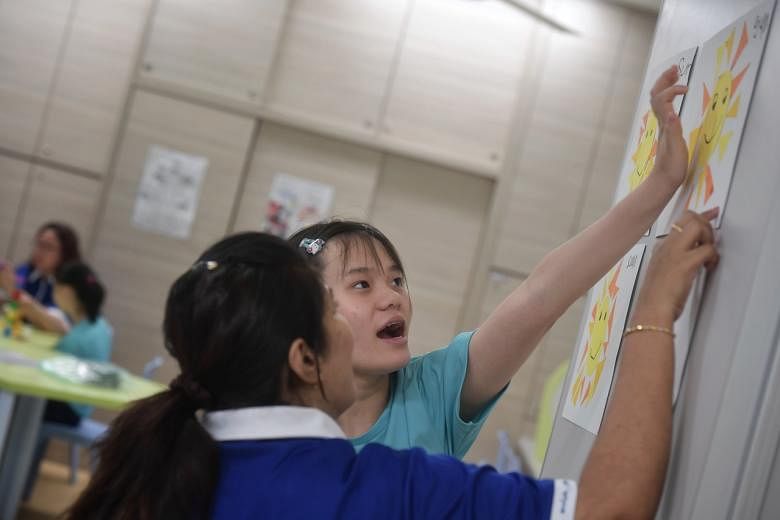SINGAPORE - Families with disabled children who are attending special student care centres will get more fee subsidies, and more will qualify for help as the income criterion is expanded.
With the extra help, most families will, on average, pay between 30 and 80 per cent less in fees.
For example, a family with a total household income of $4,000 a month will only pay $142 a month when the more generous subsidies kick in, which is about 75 per cent less than the $582 they had to pay previously.
Meanwhile, the eligible household income for means-tested subsidies will be raised from $4,000 to $9,200 a month.
Special student care centres provide after-school care and supervision for children with disabilities who are aged between seven and 18.
The changes will take effect from July 1, said Minister of State for Social and Family Development Sam Tan in Parliament on Thursday (March 5).
Responding to Mr Seah Kian Peng (Marine Parade GRC) on the affordability of special student care centres, he said such centres are "particularly essential" for caregivers who need to work or care for other dependants and themselves.
There are currently five special student care centres located in or near special education schools, with about 130 students enrolled in them now.
Madam Valerie Lim, 43, a single parent with three children, said her daughter, Kylie, has benefited from attending the Raintree Special Student Care Centre run by Minds, a charity helping people with intellectual disability.
Kylie, 17, has an intellectual disability and autism spectrum disorder.
She said: "I find that Kylie is better at communicating now and she is also more cheerful as she has made friends at the special student care centre. When she is happy, she is also better able to learn to be more independent."
Madam Lim, who is an accounts and administrative assistant earning less than $3,000 a month, is thankful for the higher subsidy.
She pays $106 a month now, and will need to fork out only $35 with the more generous subsidies.
Meanwhile, SG Enable, the agency set up by the MSF to support people with disabilities, has launched a new online resource called the Enabling Guide.
This is a one-stop website to help people find information on the various disability schemes and services.
From Oct 1 this year, SG Enable will be the single touch point for disability services here.
It will take over the administration of disability programmes currently run by the MSF and the National Council of Social Service.
This includes the funding administration and management of services by special education schools and adult disability homes.
Mr Tan said: "Bringing different functions under one roof will improve efficiency, oversight and co-ordination of services. In addition, it will provide clear direction for the many helping hands involved."
He also gave an update on the three work groups for people with disabilities which are looking into employment, independent living and inclusive pre-schools, which have consulted more than 200 people with disabilities and their caregivers since they were formed last year, as well as over 40 social service agencies in the disability sector.
For example, the employment work group identified four areas where more could be done, like helping the disabled person's improve his work capabilities such as through stronger soft-skills like communication.
It will also create alternative supported employment models and job opportunities for this group, who may not be ready to find a job on the open market yet.
The groups will release their recommendations later this year.


